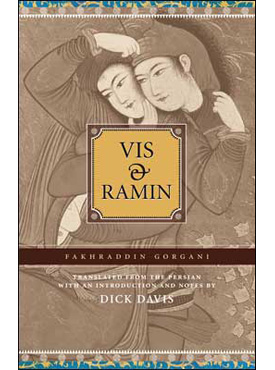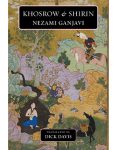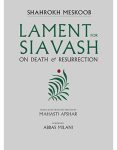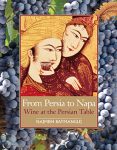About the Book
Vis & Ramin is one of the world’s great love stories. It was the first major Persian romance, written between 1050 and 1055 in rhyming couplets. This remarkable work has now been superbly translated into heroic couplets (the closest metrical equivalent of the Persian) by the poet and scholar Dick Davis.
Vis & Ramin had immense influence on later Persian poetry and is very probably also the source for the tale of Tristan and Isolde, which first appeared in Europe about a century later.
The plot, complex yet powerfully dramatic, revolves around royal marital customs unfamiliar to us today. Shahru, the married queen of Mah, refuses an offer of marriage from King Mobad of Marv but promises that if she bears a daughter she will give the child to him as a bride. She duly bears a daughter, Vis, who is brought up by a nurse in the company of Mobad’s younger brother Ramin. By the time Vis reaches the age of marriage, Shahru has forgotten her promise and instead weds her daughter to Vis’s older brother, Viru. The next day Mobads brother Zard arrives to demand the bride, and fighting breaks out, during which Vis’s father is killed. Mobad then bribes to hand Vis over to him. Mobad’s brother Ramin escorts Vis to her new husband and falls in love with her on the way. Vis has no love for and turns to her old nurse for help….
Told in language that is lush, sensual and highly inventive, Vis and Ramin is a masterpiece of psychological perceptiveness and characterization: Shahru is worldly and venal, the nurse resourceful and amoral (she will immediately remind Western readers of the nurse in Shakespeare’s Romeo and Juliet), Vis high-spirited and determined, Ramin impetuous and volatile. And the hopeless psychological situation of Vis’s husband, Mobad, flickers wearily from patience to self-assertion to fury and back again. The origins of Vis and Ramin, are obscure. The story dates from the time of the Parthians (who ruled Persia from the third century bce to the third century ce), and certainly existed in oral and perhaps written form before the eleventh century Persian poet Fakhraddin Gorgani composed the version that has come down to us.
Reviews
DAVIS’ TRANSLATION MIGHT BE ONE OF THE MOST BEAUTIFUL THINGS I HAVE EVER READ
Dick Davis has refreshed the classic verse form of the English epic—iambic pentameter couplets—and brought a very non-Western poem into the Western canon. His accomplishment is such that one wonders what might have happened to Western literature if Persia had triumphed at the Battle of Salamis. Vis & Ramin may not be the truest or greatest epic ever written, but it is the sexiest, and at times I could not help thinking that Davis’ translation might be one of the most beautiful things I had ever read. –Mark Jarman, The Hudson Review
LOVE ON THE ROOF
One of the most extraordinary and fascinating love narratives produced anywhere in the medieval world, Islamic or Christian….Excellent introduction makes a convincing case for Vis and Ramin being the source for Tristan and Isolde…New translation by the poet Dick Davis, widely regarded as our finest translator of Persian poetry, in heroic couplets…This wonderful work should win Gorgani the Western audience he richly deserves. —Times Literary Supplement
That the course of true love never runs smoothly is the grand theme of Gorgani’s immense eleventh-century Persian verse romance that, given its age and the presumed far greater sophistication of twenty-first-century people, should be unreadably and temperamentally archaic. Yet, as translator Davis points out in a long, keenly interesting historical-critical introduction, those who enjoy florid romantic operas (early-nineteenth-century bel canto works, he suggests) or the lovesick blues of so much American country music, and give Gorgani a chance, may find themselves on familiar ground. The story is that of a love triangle, the sides of which are a king, the queen promised him before she was born, and her lover, the king s youngest brother. Over the course of 10 years, the lovers are parted, forcibly and voluntarily, and reunited time after time. When they are together, they rapturously hail their happiness; when parted, they wallow in misery; when planning reunification and actually reuniting, they trade elaborate recriminations before falling into one another s arms. Davis has rendered the couplets of Gorgani into end-rhymed iambic pentameters so fluently and precisely (slant rhymes are astonishingly few) that the passion of the poem s sensuous rhetoric sweeps the reader along in defiance of the relative lack of action. A masterpiece of both its author’s and its translator’s arts. —Booklist, Ray Olson
PICS OF THE EPICS…Persian scholar’s [brilliant] heroic couplets: “You are both good and evil now to me,/You are my sickness and its remedy,/You’re all that’s bitter to me, all that’s sweet,/You’re pleasure and disaster, cold and heat.” —Dennis Drabelle, The Washington Post,
Before Romeo and Juliet, before Paolo and Francesca, before Tristan and Isolde, Vis and Ramin sighed and suffered. This gorgeous poem, beautifully rendered in rhyming couplets by the poet Dick Davis, tells a story that is both familiar and completely foreign to the western reader. Vis falls in love with her husband’s brother… there’s a sly nurse who orchestrates secret trysts… But the greatest pleasure in this poem, beyond the thrill of discovering a precedent we didn’t know existed, is the sheer glory of the language. I quote from a description of a battle, early in the poem: “And, elsewhere, sudden arrows entered eyes / Like sleep that takes a warrior by surprise; / Like love, spears pierced through hearts, and like good sense / Axes split open heads and arguments. / It seemed that swords found out exactly where / God placed the soul with such abundant care, / And where men’s flesh was opened by the blade / The soul fled through the gaping wound it made.”
—MI458
Excerpt
From the Introduction
… The emphasis on pleasure can be seen partly as a survival from Zoroastrianism, the ancient pre-Islamic religion of Iran. Until Zoroastrianism was modified by Manicheism, physical pleasure was seen as a gift of the good principle of life, Ahura Mazda, and gratitude for its presence and its assiduous cultivation were seen virtually as religious duties. This partly accounts for the importance given to wine drinking in the poem. It’s clear from both Vis and Ramin and a number of other texts that are contemporary with it that excessive wine drinking was associated with the pre-Islamic courts of Iran, and that, despite the triumph of Islam, the custom had continued to flourish in courtly circles, especially in eastern Iran, which seems to have hung on to its pre-Islamic roots more assiduously than most other areas of the country. Wine drinking to the point of drunkenness is expected of the members of the court in Gorgani’s poem (almost every time we see the king go to bed, the fact that he is drunk is mentioned, and there is usually no implication that this is a reprehensible state for him to be in). Constant wine drinking is also one of the main occupations of the lovers, Vis and Ramin, whenever they are together, and Eros and wine become inextricably linked as the story develops. The pleasure that is given most emphasis in the poem is of course erotic pleasure, and the nurse’s frank statement to Vis that she can have no idea of what real happiness is until she has experienced sexual pleasure is made with an impatience that implies that morality, and all questions of how and with whom one might experience this pleasure, are fairly minor concerns:
You’ve never truly slept with any man.
You’ve had no joy of men, you’ve never known
A man whom you could really call your own . . .
What use is beauty if it doesn’t bless
Your life with pleasure and love’s happiness?
You’re innocent, you’re in the dark about it,
You don’t know how forlorn life is without it.
Women were made for men, dear Vis, and you
Are not exempt, whatever you might do.
And to make quite sure that Vis knows what she is talking about, the nurse goes on to add:
God made us so that nothing’s lovelier than
What we as women feel when with a man,
And you don’t know how vehemently sweet
The pleasure is when men and women meet;
If you make love just once, I know that then
You won’t hold back from doing so again.
As in the literary representations of most courtly worlds, along with pleasure comes protocol, and the backbiting that accompanies slips in protocol; as her nurse says to Vis at one point:
Surely you see
You’re going to have to act appropriately.
There are a hundred things we have to do
Simply because the world expects us to;
This is a very hothouse world, and if the opportunities for pleasure are numerous and varied so are the opportunities for disgrace. Associated with the currency of one’s good name is the fairly frequent invocation of chivalry, especially by Ramin, as an ideal of behavior. An aspect of the poem that is perhaps startling at first, given the emphasis on courtly protocol, chivalry, and correct behavior, but which has clear parallels in Western medieval narratives that deal with the same kind of world, is the validation of adultery. The nurse’s admonitions to Vis, once her charge has realized she is married to someone for whom she feels no affection, are given with cynical insouciance:
The well-born women of the world delight
In marrying a courtier or a knight,
And some, who have a husband, also see
A special friend who’s sworn to secrecy;
She loves her husband, she embraces him,
And then her happy friend replaces him.
About the Author
About the Translator
Dick Davis brings a unique array of gifts to the challenges of translating Hafez and his contemporaries. In his own right, he is a poet of great technical accomplishment and emotional depth. He is also the foremost English-speaking scholar of medieval Persian poetry now working in the West. Numerous honors testify to his talents. In the U.K., he received the Royal Society of Literature’s Heinemann Award for his second book of poems, Seeing the World, in 1981; his Selected Poems was chosen by both the Sunday Times and the Daily Telegraph as a Book of the Year in 1989; and his collection Belonging was selected as the Poetry Book of the Year by The Economist in 2003. In the U.S., A Kind of Love—the American edition of his Selected Poems—received the Ingram Merrill prize for “excellence in poetry” in 1993. He has received awards for his scholarship from the Arts Council of Great Britain, The British Institute of Persian Studies, and the Guggenheim Foundation, and he is the recipient of grants for his translations from the National Endowment for the Humanities and the National Endowment for the Arts. Twice, in 2000 and 2001, he received the Translation Award of the International Society for Iranian Studies, and in 2001 he received an Encyclopedia Iranica award for “services to Persian poetry.” His translation of Ferdowsi’s Shahnameh: the Persian Book of Kings was chosen as one of the “ten best books of 2006” by the Washington Post.
Davis read English at Cambridge, lived in Iran for eight years (he met and married his Iranian wife Afkham Darbandi there), then completed a PhD in Medieval Persian Literature at the University of Manchester. He has resided for extended periods in both Greece and Italy (his translations include works from Italian), and has taught at both the University of California and at Ohio State University, where he was for nine years Professor of Persian and Chair of the Department of Near Eastern Languages, retiring from that position in 2012. In all, he has published more than twenty books and is a Fellow of the Royal Society of Literature.
Among the qualities that distinguish his poetry and scholarship are exacting technical expertise and wide cultural sympathy—an ability to enter into distant cultural milieus both intellectually and emotionally. In choosing his volume of poems Belonging as a “Book of the Year” for 2006, The Economist praised it as “a profound and beautiful collection” that gave evidence of “a commitment to an ideal of civilized life shared by many cultures.” the Times Literary Supplement has called him “our finest translator of Persian poetry.” In 2009 Mage published a book of Dick Davis’s own poems about Iran: At Home and Far From Home: Poems on Iran and Persian Culture. His book about the Shahnameh, Epic and Sedition was published by Mage in paperback in 2006. His books of translations are: Borrowed Ware: Medieval Persian Epigrams (1998), The Shahnameh (2004); The Legend of Seyavash (2004); Rostam: Tales of Love and War from Persia’s Book of Kings (2007); Vis and Ramin (2008); Faces of Love: Hafez and the Poets of Shiraz (2012).









